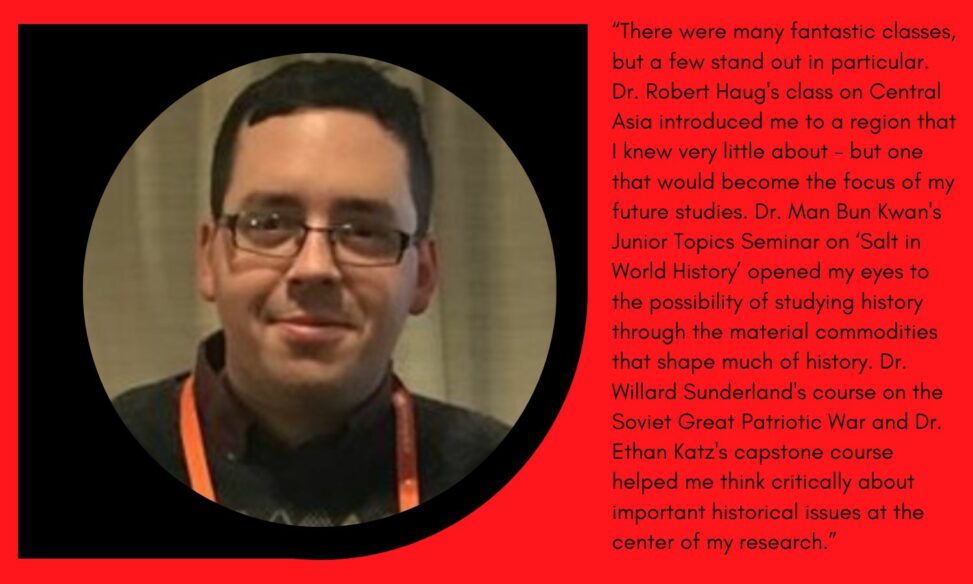I am originally from Toledo, OH. I graduated from the History Department at the University of Cincinnati in 2014 and was awarded the George B. Engberg and Emma Louis Parry Prizes during my time at UC.
What are you up to these days?
I am in the final stages of a Ph.D. program in History at The Ohio State University. My research interests build on my education at UC’s History Department. I look at changes in labor and environment in post-WWII Soviet Central Asia. I also regularly serve as a teaching assistant in the History Department at OSU. This semester, I am teaching my own survey of Russian Imperial and Soviet history.
What brought you to history at UC?
When I graduated from high school, I knew I wanted to pursue a degree in History. UC offered one of the best programs in the state; the department’s smaller size and the clear commitment of the faculty to their students made the choice a no-brainer.
What did you focus on as a history student at UC?
I primarily took classes in Russian, European, and East Asian history. By the end of my degree, I focused on the Russian Empire and the former Soviet Union.
Did you have any favorite history courses? Which ones and why?
There were many fantastic classes, but a few stand out in particular. Dr. Robert Haug’s class on Central Asia introduced me to a region that I knew very little about – but one that would become the focus of my future studies. Dr. Man Bun Kwan’s Junior Topics Seminar on ‘Salt in World History’ opened my eyes to the possibility of studying history through the material commodities that shape much of history. Dr. Willard Sunderland’s course on the Soviet Great Patriotic War and Dr. Ethan Katz’s capstone course helped me think critically about important historical issues at the center of my research.
What did you focus on in your capstone and why?
I wrote two capstone papers – one in my junior year and one in my senior year. The first one focused on international human rights law and US Relations with Yugoslavia and was inspired by work with Maribeth Mincey and Dr. Stephen Porter. The second paper, “A New Friendship? War Propaganda and Central Asians in the Great Patriotic War,” focused on the Soviet Union’s mobilization of Central Asians during WWII. I chose these topics because they were interesting to me at the time. Thinking about the Central Asian Republics and their place within the former Soviet Union continues to be at the center of my academic research.
What skills did you pick up from studying history that have served you well beyond your courses?
The skills I developed in critical thinking and writing served me well in various jobs outside of the world of higher education and, obviously, in my continued studies in history.
Have any advice for current students?
Take a wide range of courses that will broaden your understanding of history. We live in a time of many challenges, and studying history can help you form a better understanding of how we arrived here. Try not to view your courses as the end of your learning but as the beginning. Pursue other opportunities where you can and take responsibility for your own learning.
